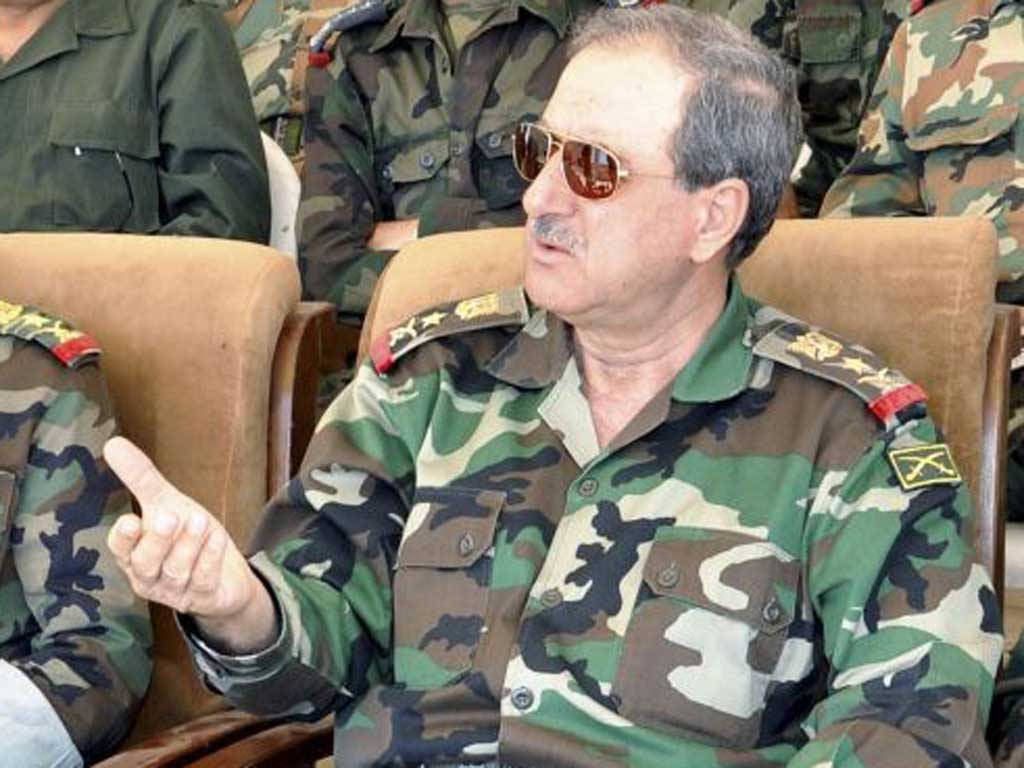General Dawoud Rajha: One of the architects of the Syrian crackdown

Syria's Defence Minister General Dawoud Rajha was the most senior government official to be killed in the Syrian uprising. As a Greek Orthodox Christian, he was something of a rarity in the Syrian military establishment, which is dominated by the Alawite sect of President Bashar al-Assad.
Rajha was born in Damascus in 1947 into a middle class Christian family. After graduating from high school he joined the military academy, graduating in 1968 as a field artillery officer. His first combat experience was during the Yom Kippur War in October 1973, and he also took part in the 1982 Lebanon war with Israel. His artillery units excelled in the battle of Sultan Yacoub in the Bekaa valley, which resulted in a rare defeat of the Israeli army. Rajha was part of the Syrian expedition force sent to Saudi Arabia during the Gulf war of 1991.
He occupied various military posts, including battalion and brigade commander, and was decorated several times for bravery. He attended numerous military training courses in leadership and command and was noted for his sharp intelligence, adroitness and shrewdness.
In 1998, Rajha was promoted to Lieutenant-General and put in charge of various military directorates in the Armed Forces. In 2004, he was appointed as the army's Deputy Chief of Staff and promoted again, to General, in 2005, and when General Ali Habib Mahmud was made Defence Minister in 2009, Rajha took over as Chief of Staff. He took an inordinate pride in his new position and worked assiduously to improve the capabilities of the Syrian army and to increase its defensive potential. Rajha was loathed, however, by his junior officers as stubborn and unsympathetic to their needs. A single stern look from him was reportedly enough to strike terror into the heart of his soldiers.
On 9 August last year Rajha was announced as the successor to General Mahmud, who was said to be among a small group of senior officers who differed with President Assad over the government's excessively violent repression of the uprising. Analysts speculated that his appointment was politically motivated rather than merit-based, part of a PR exercise to stress the multi-ethnicity of the military and security services in order to gain the support of the Christian minority.
As Defence Minister Rajha helped orchestrate and implement the regime's brutal crackdown. He saw the uprising as a Western plot to destabilise and weaken Syria and praised Russia for its "honourable support for the Syrian people". Rajha instilled a semblance of order into the army and got on with the task of stifling the uprising with pitiless cruelty. It was under his command that the Syrian army juddered into life and began to regain lost ground.
The EU placed Rajha on its list of designated officials, citing him as "responsible for the military involvement in the crackdown of peaceful protesters", and in March this year the US Treasury Department imposed sanctions on the General, alleging that he was "reportedly chosen for his loyalty to the Assad regime".
On 20 May this year, the Free Syrian Army declared that it had assassinated Rajha and seven other members of the government's military crisis unit. In fact almost two months after the date of his alleged death, he was killed in the explosion at the Syrian National Security Building in Damascus that also eliminated several other members of President Assad's inner circle. His funeral, at the Holy Cross Church in Damascus, was led by the Greek Orthodox Patriarch Ignatius IV. Rajha's death will have reverberated with Syria's minority Christian community, which makes up about 11 per cent of the population and has so far stood by the regime.
Dawoud Abdullah Rajha, soldier and politician: born Damascus, Syria 1947; married (four children); died Damascus 18 July 2012.
Join our commenting forum
Join thought-provoking conversations, follow other Independent readers and see their replies
Comments
Bookmark popover
Removed from bookmarks